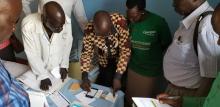With support from WHO, the Ministry of Health to rollout Mobile Phone-Based Surveillance System to every health facility in South Sudan
15 February 2019, Juba – In 2016, with support from WHO and partners, South Sudan was the first country in the world to roll out “EWARS in a box,” the early warning, alert and response system (EWARS) that permitted mobile phone-based reporting of priority outbreak-prone diseases from a number of partner-supported health facilities in the conflict-affected areas of the country.
Over the years, the system has served as a key surveillance tool for outbreak-prone diseases (such as measles, viral haemorrhagic fevers, and cholera) and other priority conditions (such as malaria and Guinea worm) in South Sudan, in support of the country’s Integrated Disease Surveillance and Response (IDSR) strategy.
A single “EWARS in a box” kit costs approximately US$ 15 000 and can support surveillance for 50 fixed or mobile sites, or roughly 500 000 people, thus providing early warning of potential disease outbreaks for a mere 3 cents per person. The system also automatically creates weekly national epidemiologic bulletins that summarize the IDSR disease situation across the country.
In 2017 EWARS was installed in every state and county throughout South Sudan, allowing health facilities’ paper-based weekly IDSR forms to be entered electronically at the county level so that higher levels of the health system (state and national) could immediately track disease occurrence and receive alerts about unusual disease patterns in any county in the country.
“Now, the ultimate goal of having each and every health facility in South Sudan enter its IDSR data directly at the facility level is within reach, with the commencement of a nationwide rollout of facility-based EWARS reporting”, said Dr Olu Olushayo, the WHO Country Representative. County by county, facility officers are being trained on how to use the EWARS mobile phones within their health facilities. This will allow instant transmission of every facility’s weekly reports and generation of specific alerts about unusual disease patterns down to individual facilities so that Rapid Response Teams can be immediately activated to investigate and respond to any outbreaks before they spread out of control.
The system will also allow individual health facilities to make urgent reports about any other unusual disease events, including unstructured rumours of disease occurrence in nearby communities (‘Community Event-based Surveillance’); this provides an additional way to alert about outbreaks that are not detected in the health facilities.
As part of South Sudan’s preparedness for possible Ebola virus disease (EVD) importation from the Democratic Republic of the Congo, the rollout also includes training on how the Event-Based Surveillance feature can be used to report suspected EVD cases. Concurrently, community leaders and the Boma Health Teams are being trained on reporting unusual events to either their local health facility for triggering alerts in EWARS or by calling the national EVD hotline, which will also trigger alerts in EWARS and activate appropriate local Rapid Response Teams.
The EWARS system can integrate with laboratories and can track also outbreaks once they are identified. The EWARS system is also flexible to allow for additional reporting requirements as needed in specific facilities, such as nutritional surveillance, mortality reports, facility service availability monitoring, and others. This increases staff efficiency by limiting the number of different channels through which reporting is done, thereby freeing staff to concentrate on their clinical work while assuring the timeliest transmission of information.
The EWARS mobile reporting rollout in South Sudan is supported by the United States Agency for International Development (USAID) as part of the program to strengthen IDSR in South Sudan.
Tel : +211923362401
Email: wamalaj [at] who.int (wamalaj[at]who[dot]int)
Epidemiologist / Team Lead, Country Support
Tel: +41 (0)22 791 1997
Email: pavlinb [at] who.int (pavlinb[at]who[dot]int)
Communications Officer
WHO Rwanda
Mobile: +250 795 450 856
Email: ebrahimj [at] who.int (ebrahimj[at]who[dot]int)



